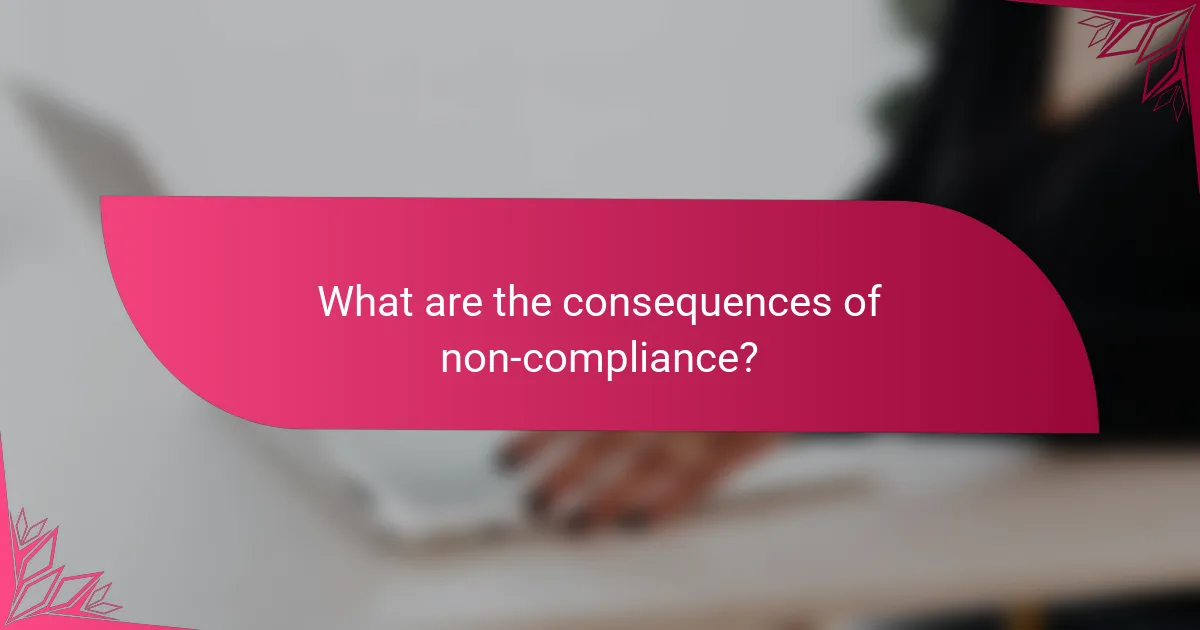In today’s digital landscape, compliance with US privacy laws is essential for effective SEO practices. Key regulations such as the California Consumer Privacy Act (CCPA) and the Children’s Online Privacy Protection Act (COPPA) impose specific requirements on businesses to protect user data. By implementing strong data protection measures and staying informed about these laws, organizations can enhance their online presence while safeguarding consumer rights.

What are the key US privacy laws affecting SEO compliance?
The key US privacy laws impacting SEO compliance include the California Consumer Privacy Act (CCPA), the General Data Protection Regulation (GDPR), the Children’s Online Privacy Protection Act (COPPA), and the Health Insurance Portability and Accountability Act (HIPAA). Each of these regulations has specific requirements that businesses must follow to ensure they protect user data and maintain compliance in their online practices.
California Consumer Privacy Act (CCPA)
The CCPA is a landmark privacy law that grants California residents specific rights regarding their personal information. Businesses must disclose what data they collect, how it is used, and who it is shared with, allowing consumers to opt-out of the sale of their data.
For SEO compliance, companies should implement clear privacy policies on their websites and ensure that any data collection practices align with CCPA requirements. This includes providing users with easy access to their data and the ability to request its deletion.
General Data Protection Regulation (GDPR)
Although GDPR is a European regulation, it affects US companies that handle data of EU residents. It mandates strict consent requirements for data collection and processing, as well as rights for individuals to access and delete their data.
To comply with GDPR, US businesses should ensure that their SEO strategies include obtaining explicit consent for cookies and tracking technologies. This may involve updating privacy notices and implementing mechanisms for users to manage their data preferences.
Children’s Online Privacy Protection Act (COPPA)
COPPA is designed to protect the privacy of children under 13 by requiring parental consent before collecting personal information from minors. Websites targeting children must adhere to strict guidelines regarding data collection and usage.
For SEO compliance, businesses should evaluate their content and marketing strategies to ensure they do not inadvertently target children without proper consent. This may include age verification processes and clear disclosures about data practices.
Health Insurance Portability and Accountability Act (HIPAA)
HIPAA governs the privacy and security of health information in the US. It requires healthcare providers and related entities to protect patient data and restricts how this information can be used or shared.
In terms of SEO, healthcare organizations must be cautious about how they handle patient data online. This includes ensuring that any marketing practices comply with HIPAA regulations and that patient information is not disclosed without proper authorization.

How can businesses ensure compliance with US privacy laws?
Businesses can ensure compliance with US privacy laws by implementing robust data protection measures, conducting regular audits, and training employees on privacy practices. These steps help organizations align with regulations such as the CCPA and GDPR, which focus on consumer rights and data security.
Implementing data protection strategies
Data protection strategies are essential for safeguarding personal information. Businesses should start by identifying the types of data they collect and determining how it is stored and processed. Utilizing encryption, access controls, and secure data storage solutions can significantly reduce the risk of data breaches.
Additionally, organizations should establish clear data retention policies to limit the duration personal information is held. Regularly reviewing these policies ensures they remain compliant with evolving regulations.
Regular privacy audits
Conducting regular privacy audits helps businesses assess their compliance with privacy laws. These audits should evaluate data handling practices, security measures, and employee adherence to privacy policies. A thorough audit can identify vulnerabilities and areas for improvement.
Consider scheduling audits at least annually or whenever significant changes occur in data processing activities. This proactive approach can prevent costly penalties and enhance consumer trust.
Employee training on privacy practices
Employee training is crucial for fostering a culture of privacy within an organization. All staff members should receive training on data protection policies, the importance of confidentiality, and how to recognize potential data breaches. Regular refresher courses can keep privacy practices top of mind.
Incorporating real-world scenarios and case studies into training sessions can help employees understand the implications of non-compliance. This practical approach equips them to handle sensitive information responsibly and effectively.

What are the consequences of non-compliance?
Non-compliance with US privacy laws can lead to significant repercussions for businesses, including financial penalties, legal actions, and damage to reputation. Understanding these consequences is crucial for maintaining compliance and protecting your organization.
Financial penalties
Financial penalties for non-compliance can vary widely, often ranging from thousands to millions of dollars depending on the severity of the violation and the specific regulations involved. For instance, the California Consumer Privacy Act (CCPA) allows fines of up to $7,500 per violation, while the Health Insurance Portability and Accountability Act (HIPAA) can impose penalties that escalate based on the level of negligence.
To avoid these penalties, businesses should regularly audit their data practices and ensure they are aligned with applicable privacy laws. Implementing robust data protection measures can help mitigate the risk of incurring fines.
Legal actions
Legal actions may arise from non-compliance, including lawsuits from consumers or regulatory bodies. Individuals may sue for damages if their privacy rights are violated, while state attorneys general can initiate enforcement actions against companies that fail to comply with privacy regulations.
To minimize the risk of legal actions, organizations should establish clear privacy policies, train employees on compliance, and maintain transparent communication with consumers regarding data usage. Proactively addressing potential legal issues can save time and resources in the long run.
Reputation damage
Reputation damage is a significant consequence of non-compliance, as consumers are increasingly concerned about their privacy. A single data breach or violation can lead to a loss of trust, resulting in decreased customer loyalty and potential loss of business.
To protect your reputation, prioritize transparency and accountability in your data handling practices. Regularly communicate with customers about how their data is used and the measures taken to protect it. Building a strong reputation for privacy compliance can enhance customer relationships and foster brand loyalty.

What tools can help with SEO compliance?
Several tools can assist businesses in achieving SEO compliance with US privacy laws and regulations. These tools help manage data privacy, ensure compliance with regulations, and track user data effectively.
OneTrust for privacy management
OneTrust is a leading platform for privacy management that helps organizations comply with various privacy regulations, including CCPA and GDPR. It offers features such as data mapping, consent management, and risk assessments to ensure that your SEO strategies align with legal requirements.
Using OneTrust, businesses can automate compliance processes and maintain transparency with users regarding data usage. This can enhance trust and improve SEO performance by ensuring that your site adheres to privacy standards.
TrustArc for compliance solutions
TrustArc provides comprehensive compliance solutions that assist organizations in navigating the complex landscape of privacy laws. Its tools include assessments, reporting, and ongoing monitoring to ensure that your SEO practices remain compliant with regulations like the CCPA.
By integrating TrustArc into your compliance strategy, you can streamline the process of managing user data and privacy policies. This proactive approach not only mitigates risks but also supports better SEO outcomes by fostering user confidence.
Google Analytics for data tracking
Google Analytics is an essential tool for tracking user data and understanding website performance, but it must be configured to comply with privacy laws. Businesses should ensure that they anonymize IP addresses and obtain user consent before collecting data to align with regulations.
To maintain compliance while using Google Analytics, regularly review your data collection practices and update your privacy policy accordingly. This not only helps in adhering to legal standards but also enhances your SEO efforts by providing valuable insights into user behavior.

What are best practices for data collection and usage?
Best practices for data collection and usage involve ensuring transparency, obtaining user consent, and implementing data protection measures. These practices help organizations comply with US privacy laws while fostering trust with users.
Obtaining user consent
Obtaining user consent is essential for legal data collection. Organizations should provide clear options for users to agree to data collection, often through checkboxes or consent forms that are easy to understand.
It is crucial to ensure that consent is informed, meaning users should know what data is being collected, how it will be used, and who it will be shared with. Regularly updating consent practices can help maintain compliance with evolving regulations.
Data anonymization techniques
Data anonymization techniques involve modifying personal data so that individuals cannot be identified. Common methods include data masking, aggregation, and pseudonymization, which can help reduce privacy risks.
Implementing these techniques allows organizations to analyze data trends without compromising individual privacy. However, it is important to balance data utility with privacy concerns, ensuring that anonymized data cannot be easily re-identified.
Clear privacy policies
Clear privacy policies are vital for informing users about data practices. These policies should be easily accessible and written in straightforward language, outlining what data is collected, its purpose, and user rights.
Regularly reviewing and updating privacy policies is necessary to reflect changes in data practices or regulations. Providing a summary of key points can enhance user understanding and compliance with privacy laws.

How do US privacy laws impact display advertising strategies?
US privacy laws significantly affect display advertising strategies by imposing restrictions on data collection and usage. Advertisers must adapt their approaches to comply with regulations while still effectively reaching their target audiences.
Targeted advertising limitations
Privacy laws such as the California Consumer Privacy Act (CCPA) limit how advertisers can use personal data for targeted advertising. These regulations often require explicit consent from users before collecting or utilizing their information, which can reduce the pool of available data for ad targeting.
Advertisers must navigate these limitations by focusing on broader audience segments or utilizing aggregated data that does not identify individual users. This shift can lead to less personalized ads, potentially impacting engagement rates.
Data usage transparency requirements
Transparency is a key requirement under US privacy laws, mandating that advertisers disclose how they collect, use, and share consumer data. This includes providing clear privacy policies and options for users to opt-out of data collection practices.
To comply, businesses should implement straightforward privacy notices and ensure that users can easily manage their data preferences. Regular audits of data practices can help maintain compliance and build trust with consumers, ultimately benefiting advertising effectiveness.
